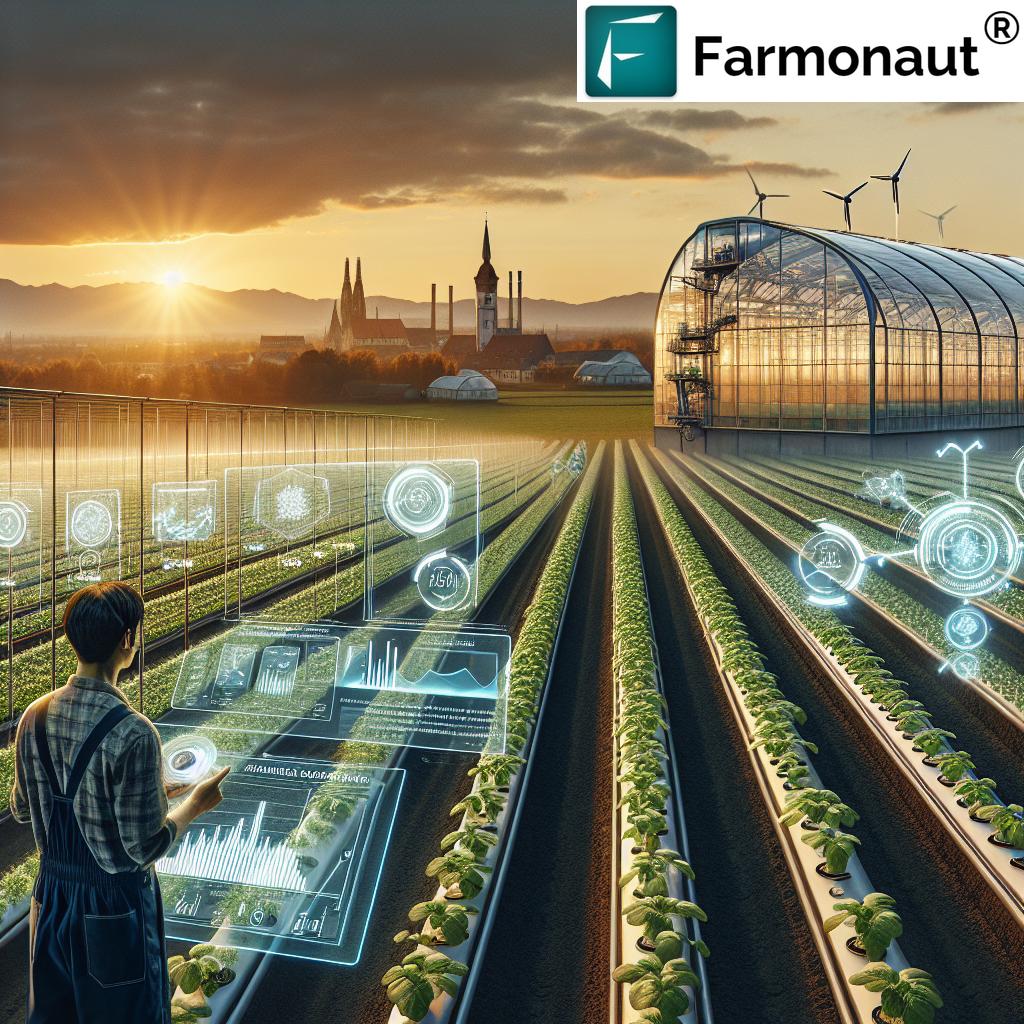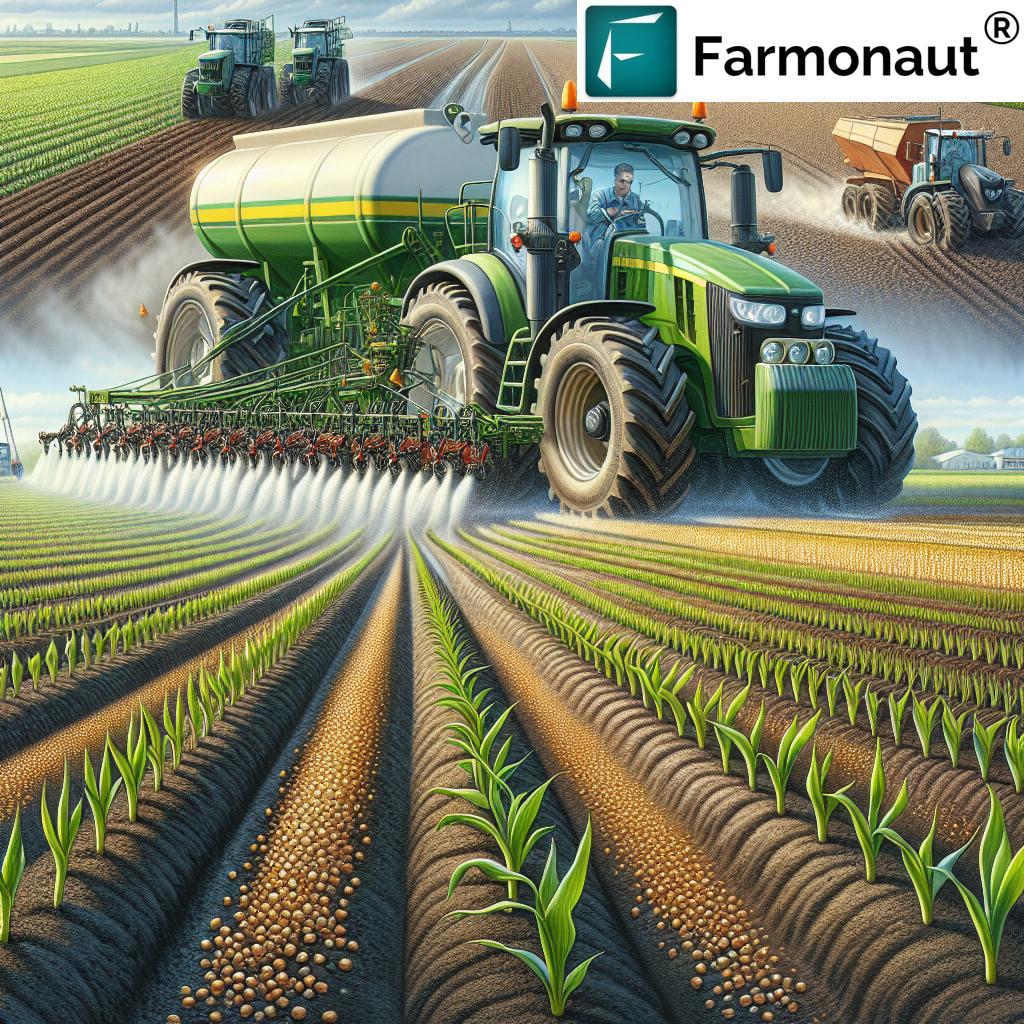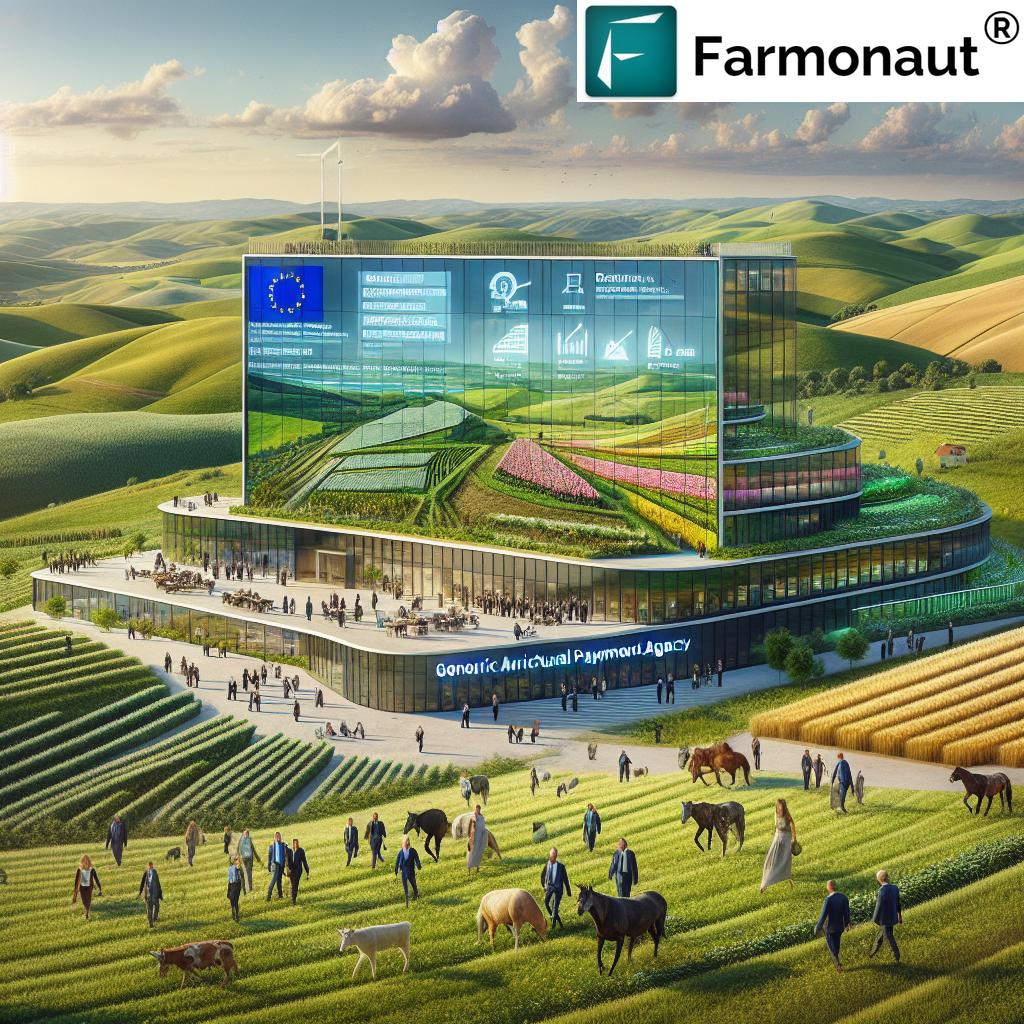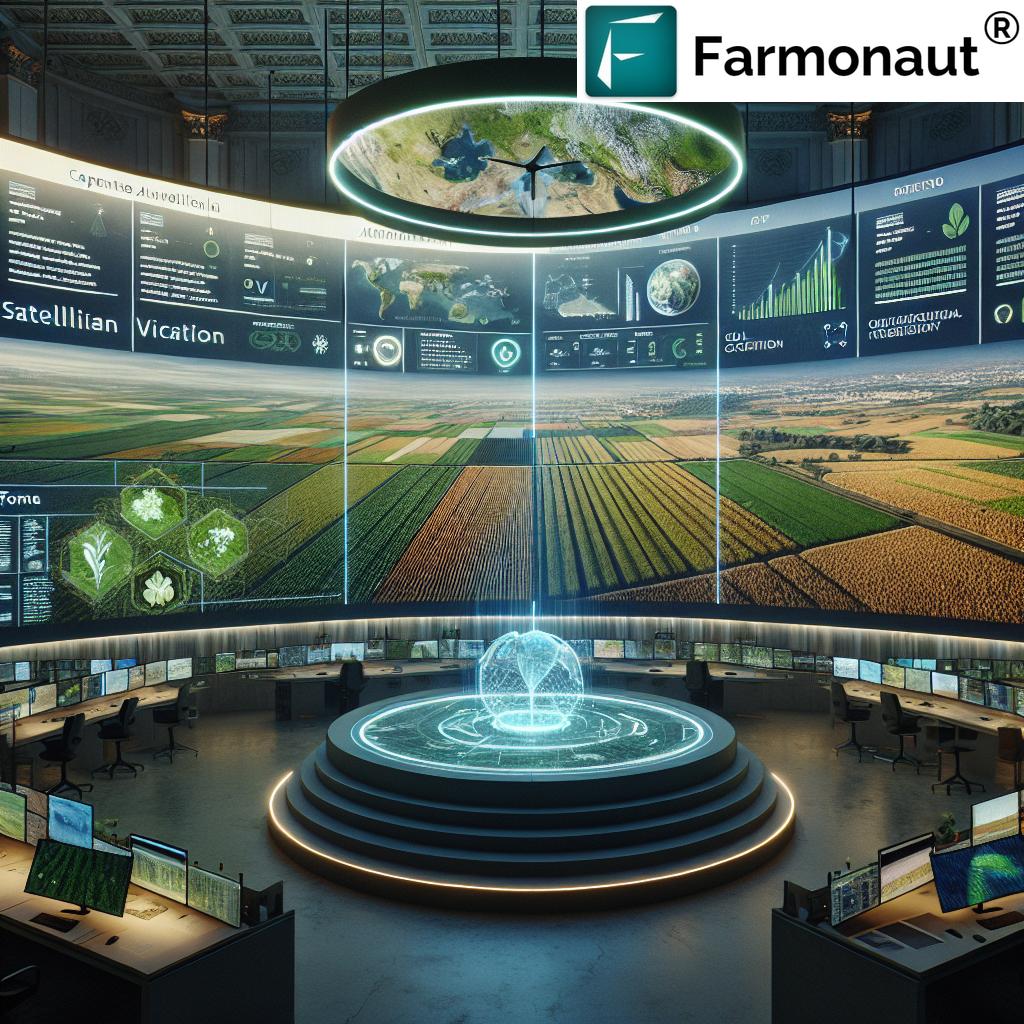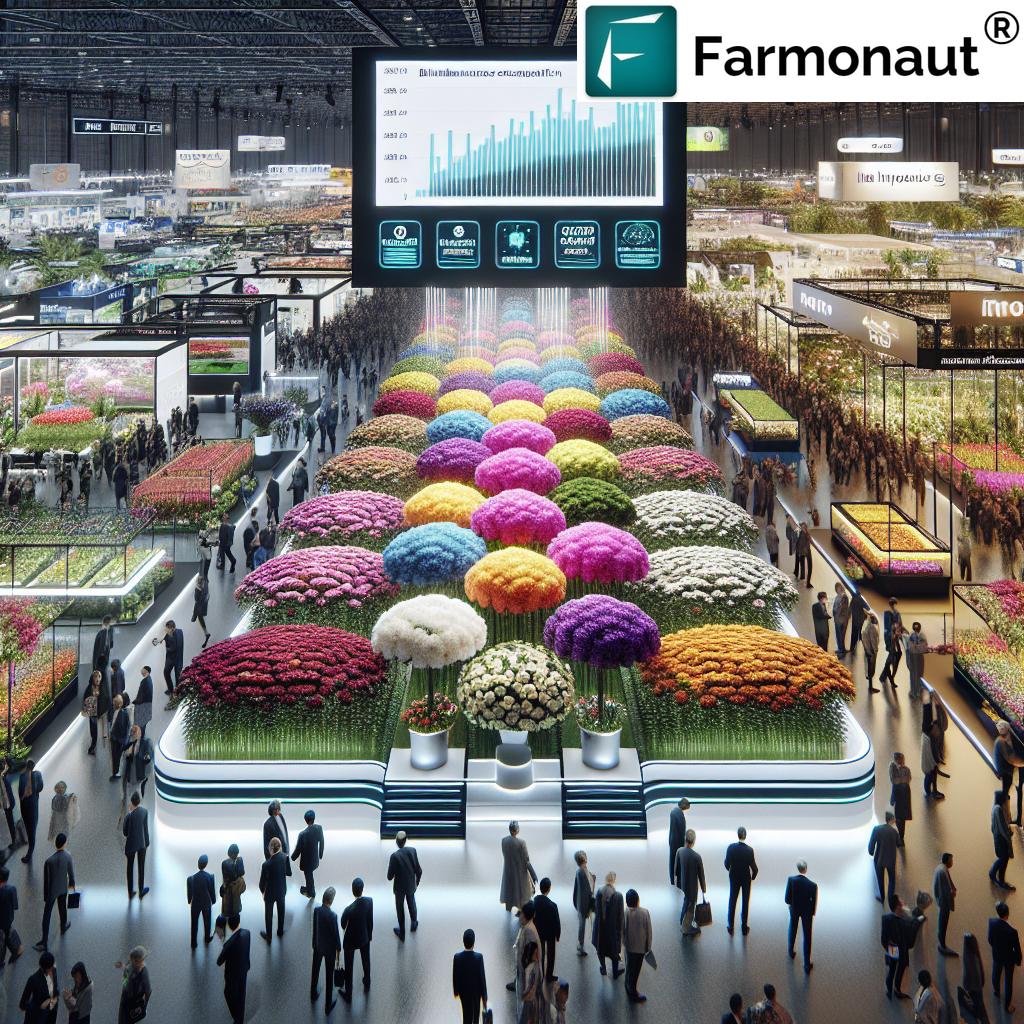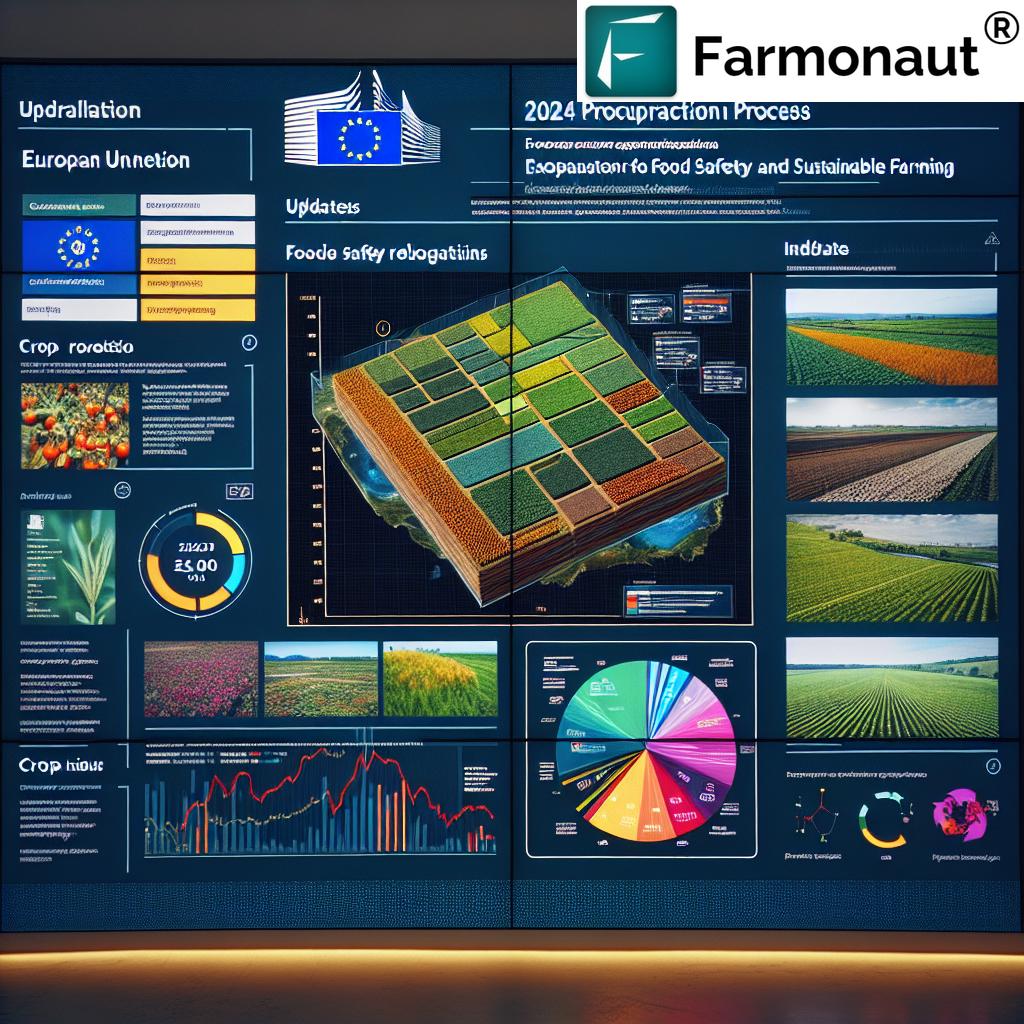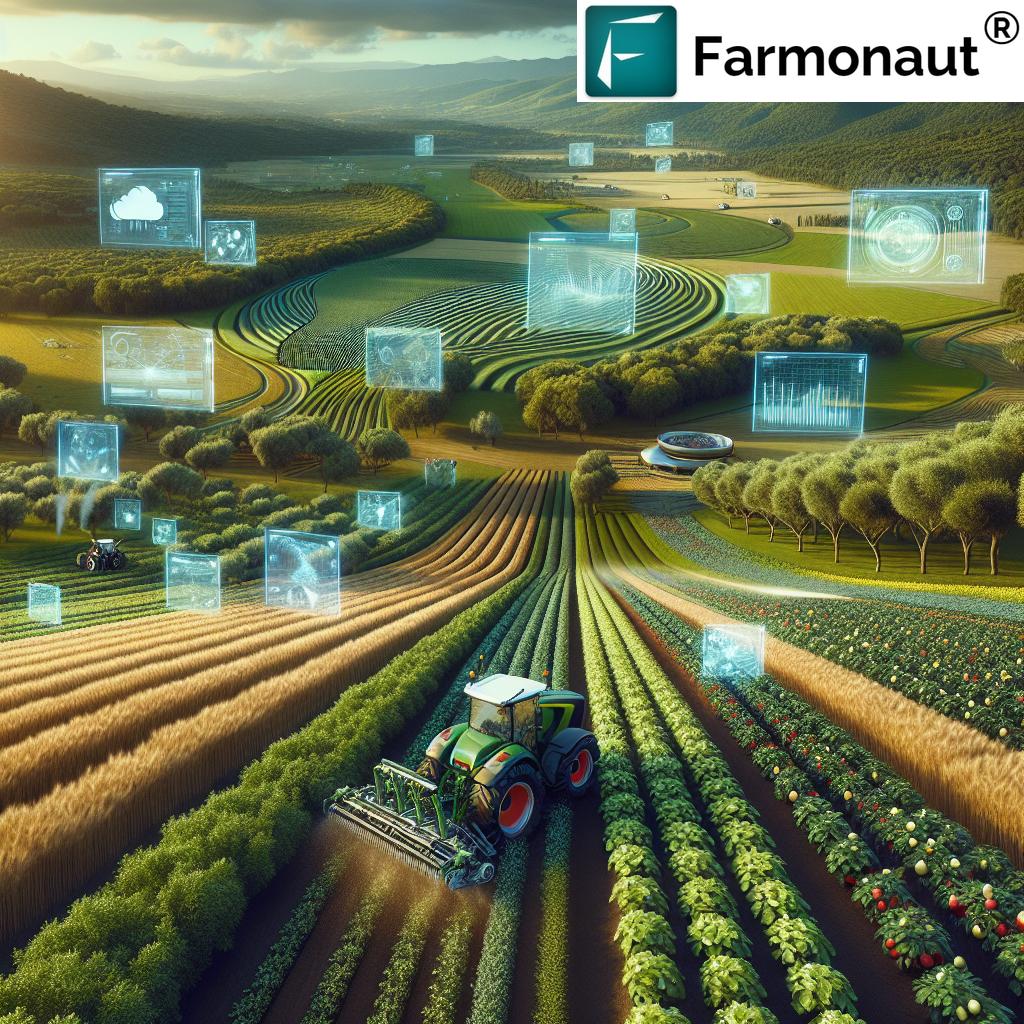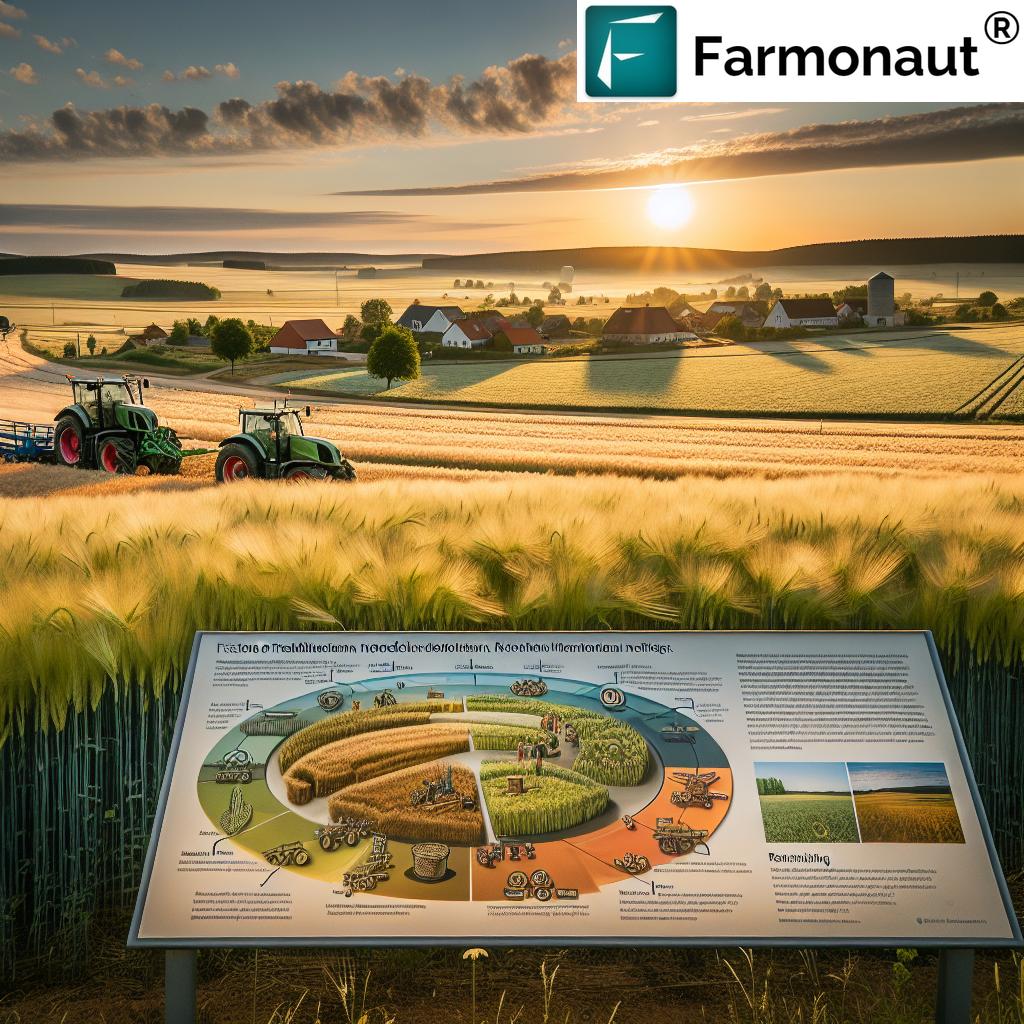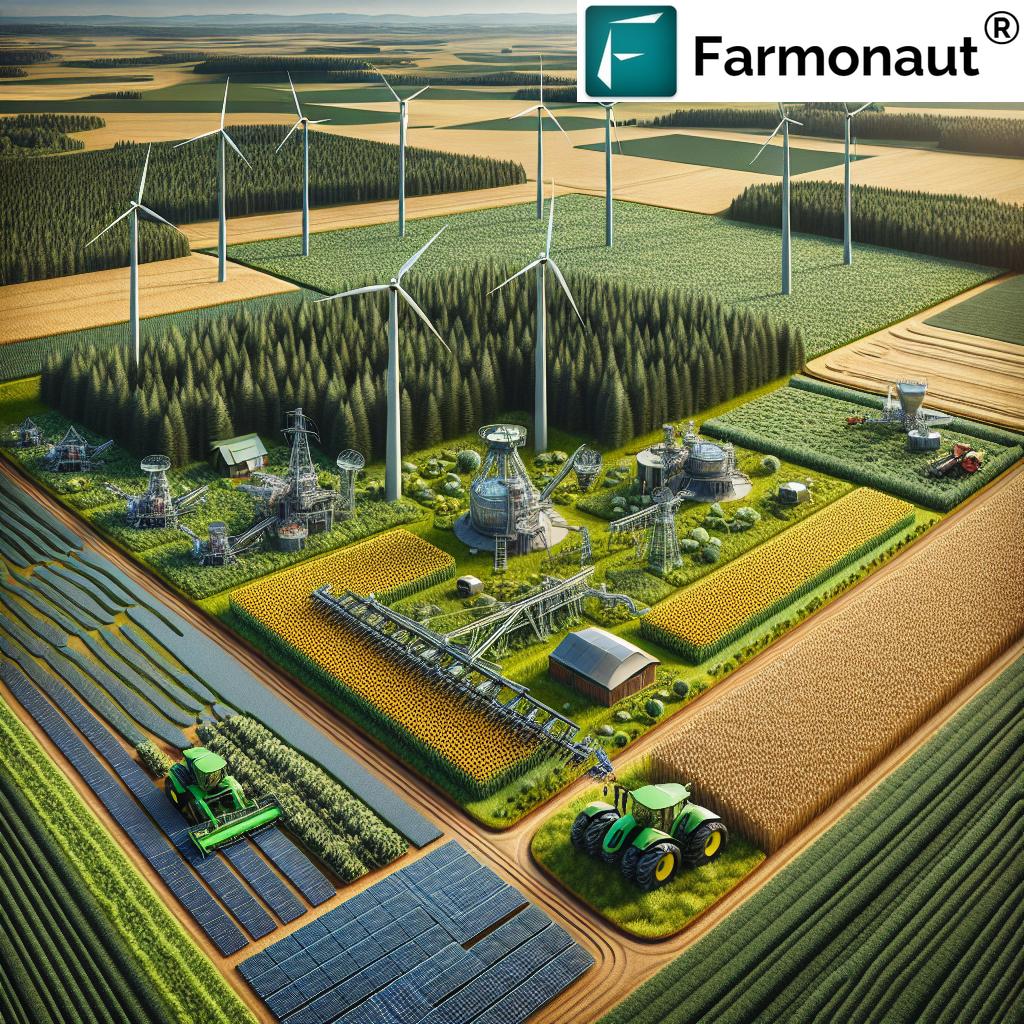Revolutionizing European Agriculture: How Sustainable Farming and EU Green Deal Policies Shape Spain’s Agricultural Future
“The EU Green Deal aims to represent over 22 million farmers in shaping Europe’s sustainable agricultural future.”
In the heart of Europe’s agricultural landscape, a profound transformation is underway. As we delve into the intricacies of European agricultural policy and sustainable farming practices, we find ourselves at the forefront of a revolution that is reshaping the future of farming across the continent, with a particular focus on Spain. The EU Green Deal for agriculture stands as a beacon of change, guiding the agri-food sector towards a more sustainable and prosperous future.
At Farmonaut, we recognize the pivotal role that innovative technologies play in this transformation. Our satellite-based farm management solutions are designed to support farmers in their journey towards precision agriculture and sustainable practices. As we explore the challenges and opportunities facing European agriculture, we’ll see how cutting-edge tools like ours contribute to the evolving landscape of farming in the region.
The EU Green Deal: A Catalyst for Agricultural Innovation
The European Union’s Green Deal is a comprehensive set of policy initiatives aimed at making Europe climate neutral by 2050. At its core, this ambitious plan recognizes the critical role of agriculture in achieving sustainability goals. Let’s examine how the Green Deal is reshaping farming practices across Europe, with a special emphasis on its impact in Spain.
- Climate-Smart Agriculture: The Green Deal promotes farming methods that reduce greenhouse gas emissions while increasing resilience to climate change.
- Biodiversity Conservation: It emphasizes the importance of preserving and restoring ecosystems on agricultural lands.
- Circular Economy in Agriculture: The initiative encourages the reduction of waste and the efficient use of resources in the agri-food sector.
In Spain, these policies are translating into tangible changes on the ground. From the olive groves of Andalusia to the cereal fields of Castilla-La Mancha, farmers are adopting new practices that align with the Green Deal’s objectives.
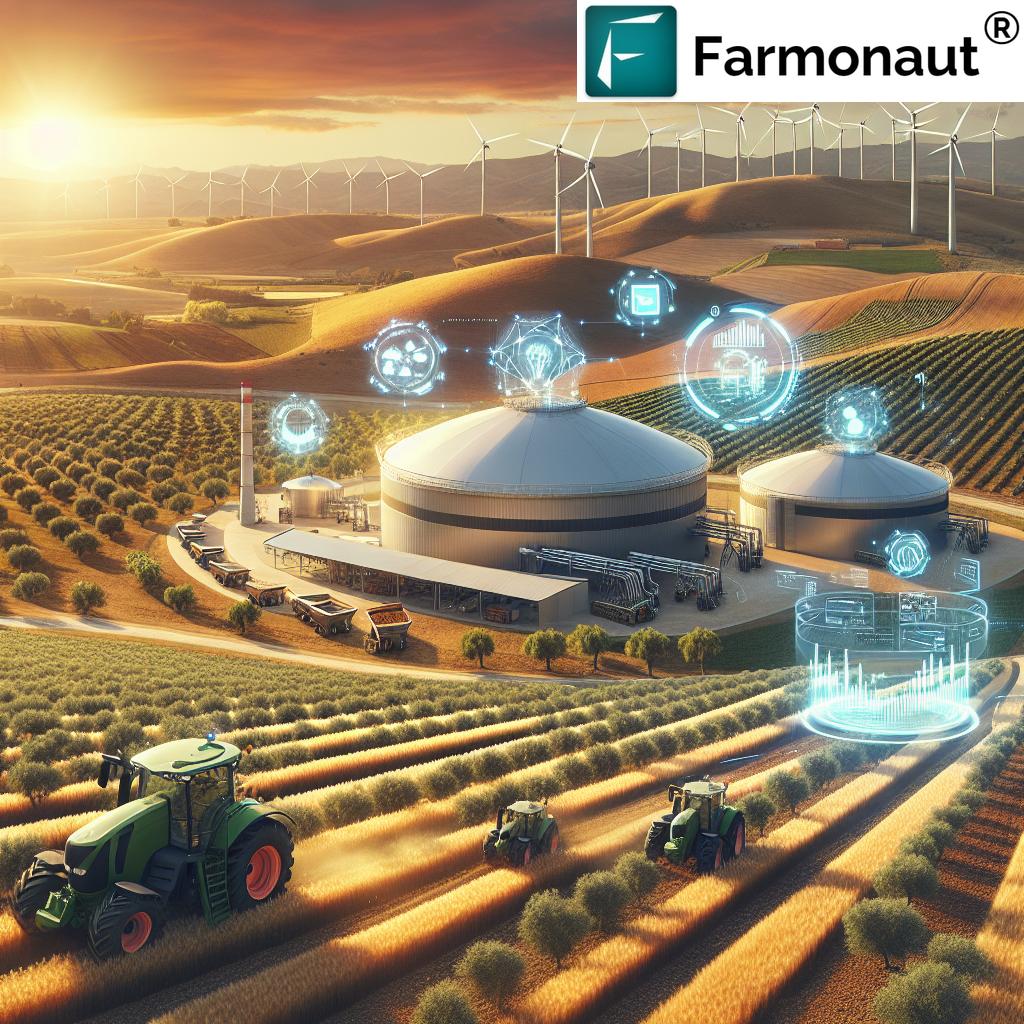
Precision Farming Technology: The Future of European Agriculture
As we navigate the challenges of modern agriculture, precision farming technology emerges as a crucial tool for European farmers. This innovative approach allows for the optimization of inputs and resources, leading to increased productivity and reduced environmental impact.
- Satellite Imagery: Advanced satellite technology provides farmers with real-time data on crop health and soil conditions.
- IoT Sensors: Internet of Things devices monitor various agricultural parameters, enabling data-driven decision-making.
- AI and Machine Learning: These technologies analyze vast amounts of data to provide actionable insights for farm management.
At Farmonaut, we’re proud to be at the forefront of this technological revolution. Our platform integrates satellite imagery with AI-powered analytics to offer farmers precise insights into their fields. This technology is particularly valuable in regions like Ciudad Real, Spain, where efficient water management is crucial for sustainable agriculture.
Sustainable Farming Practices in Spain: A Model for Europe
Spain’s agricultural sector is embracing sustainable farming practices with enthusiasm, setting an example for other European nations. These methods not only align with the EU Green Deal but also address specific challenges faced by Spanish farmers, such as water scarcity and soil degradation.
- Conservation Agriculture: Minimal tillage and crop rotation techniques are being adopted to improve soil health.
- Efficient Irrigation Systems: Drip irrigation and precision watering technologies are helping conserve water in arid regions.
- Integrated Pest Management: Biological control methods are reducing the reliance on chemical pesticides.
These practices are particularly evident in Spain’s olive groves, where traditional methods are being combined with modern technologies to create more sustainable and productive orchards.
The Role of Agrotourism in Spain’s Agricultural Economy
“Agrotourism is emerging as a significant economic contributor to Europe’s evolving agricultural landscape.”
Agrotourism is playing an increasingly important role in diversifying income streams for Spanish farmers. This sector not only provides additional revenue but also helps to preserve rural traditions and landscapes.
- Farm Stays: Tourists can experience life on a working farm, participating in daily activities.
- Culinary Tourism: Visitors are drawn to experience local, farm-to-table cuisine.
- Educational Programs: Farms offer workshops on sustainable farming practices and traditional crafts.
In regions like the Basque Country and Galicia, agrotourism is helping to revitalize rural economies while promoting sustainable agricultural practices.
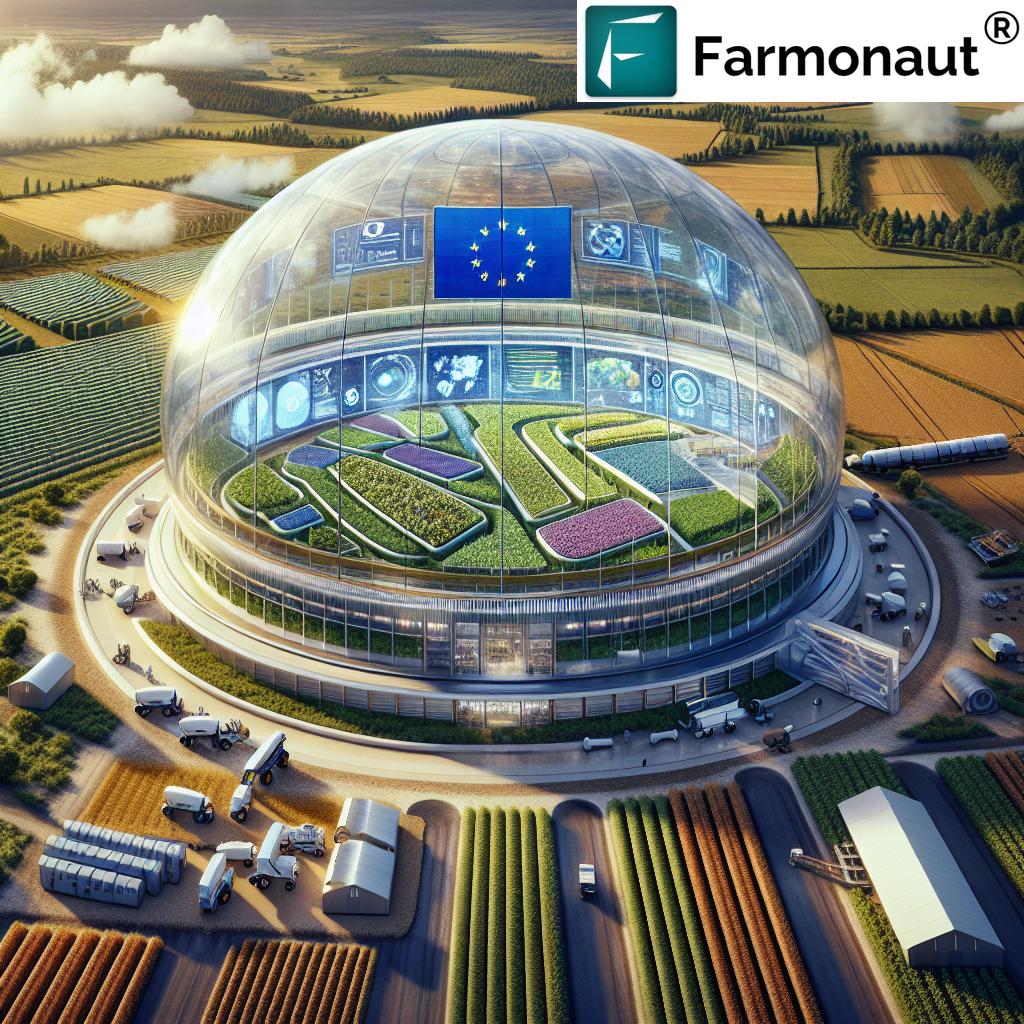
Agricultural Supply Chain Management: Ensuring Food Security and Sustainability
Efficient agricultural supply chain management is crucial for ensuring food security and promoting sustainability in Europe’s farming sector. The EU Green Deal emphasizes the need for transparent, resilient, and environmentally friendly supply chains.
- Traceability Systems: Implementing blockchain technology to track products from farm to fork.
- Reducing Food Waste: Improving logistics and storage to minimize losses along the supply chain.
- Promoting Local Supply Chains: Encouraging shorter supply chains to reduce transportation emissions and support local economies.
In Spain, initiatives like the “Km 0” movement are gaining traction, promoting locally sourced products and reducing the carbon footprint of food distribution.
Explore Farmonaut’s API for Supply Chain Solutions
Renewable Energy in Farming: Powering Sustainable Agriculture
The integration of renewable energy sources in farming operations is a key component of the EU’s strategy for sustainable agriculture. Spain, with its abundant solar and wind resources, is leading the way in this transition.
- Solar-Powered Irrigation: Using photovoltaic systems to power water pumps and irrigation systems.
- Biomass Energy: Utilizing agricultural waste to generate heat and electricity.
- Wind Energy on Farms: Installing small-scale wind turbines to power farm operations.
These renewable energy solutions not only reduce the carbon footprint of farming operations but also provide farmers with additional income streams through energy sales to the grid.
The Economic Impact of Agriculture in Spain
Agriculture remains a vital sector of the Spanish economy, contributing significantly to GDP and employment. The implementation of sustainable practices and technologies is reshaping the economic landscape of farming in the country.
- Export-Oriented Production: Spain is a leading exporter of fruits, vegetables, and olive oil within the EU.
- Job Creation: Sustainable farming practices are creating new employment opportunities in rural areas.
- Value-Added Products: The focus on quality and sustainability is increasing the value of Spanish agricultural products in international markets.
The adoption of precision farming technologies, like those offered by Farmonaut, is helping Spanish farmers increase productivity and profitability while adhering to sustainable practices.
Access Farmonaut’s API Developer Docs for Economic Insights
Innovation in the Bioeconomy: Spain’s Contribution to European Agriculture
The bioeconomy is an emerging sector that holds great promise for sustainable agriculture in Europe. Spain is actively contributing to this field through research and innovation.
- Biopesticides: Developing natural alternatives to chemical pesticides.
- Biofertilizers: Creating innovative fertilizers from organic waste and microorganisms.
- Bioplastics: Producing biodegradable materials from agricultural byproducts.
These innovations are not only enhancing the sustainability of Spanish agriculture but also opening up new markets and economic opportunities for farmers.
Representing Europe’s Farmers: Organizations Shaping Agricultural Policy
Various organizations play a crucial role in representing the interests of European farmers and shaping agricultural policy. These groups work to ensure that the voice of farmers is heard in the implementation of the EU Green Deal and other policy initiatives.
- Copa-Cogeca: The largest agricultural lobby group in Europe, representing over 22 million farmers.
- European Council of Young Farmers (CEJA): Advocating for the interests of young farmers across the EU.
- Spanish Association of Young Farmers (ASAJA): Representing the specific concerns of Spanish farmers at the national and EU level.
These organizations are instrumental in ensuring that sustainable farming practices are implemented in a way that is economically viable for farmers.
Policy Areas Crucial for Balancing Productivity and Environmental Stewardship
The EU Green Deal encompasses several policy areas that are critical for achieving a balance between agricultural productivity and environmental protection. These policies are shaping the future of farming in Spain and across Europe.
- Common Agricultural Policy (CAP) Reform: Aligning EU agricultural subsidies with sustainability goals.
- Farm to Fork Strategy: Promoting sustainable food systems from production to consumption.
- Biodiversity Strategy: Protecting and restoring ecosystems in agricultural landscapes.
These policies are driving the adoption of sustainable farming practices and technologies, such as those offered by Farmonaut, across Spain and the EU.
Collaborative Efforts Driving a Sustainable Future for European Farming
The transition to sustainable agriculture in Europe requires collaboration between various stakeholders, including farmers, policymakers, researchers, and technology providers.
- Public-Private Partnerships: Fostering innovation through collaboration between government, industry, and academia.
- Cross-Border Initiatives: Sharing best practices and technologies across EU member states.
- Farmer Networks: Creating platforms for knowledge exchange and mutual support among farmers.
These collaborative efforts are crucial for implementing the EU Green Deal and driving the adoption of sustainable farming practices across Europe.
EU Green Deal Agricultural Initiatives Comparison
| Country | Sustainable Farming Practice | Implementation Progress (%) | Estimated CO2 Reduction (tons/year) | Economic Impact (€ millions) |
|---|---|---|---|---|
| Spain | Precision irrigation in olive groves | 65 | 500,000 | 750 |
| France | Agroforestry in vineyards | 40 | 300,000 | 500 |
| Germany | Organic farming expansion | 55 | 450,000 | 800 |
| Italy | Sustainable rice cultivation | 50 | 250,000 | 400 |
| Netherlands | Circular greenhouse horticulture | 70 | 600,000 | 900 |
Farmonaut’s Role in Advancing Sustainable Agriculture
As we’ve explored the various aspects of sustainable agriculture in Europe and Spain, it’s clear that technology plays a crucial role in this transformation. Farmonaut’s satellite-based farm management solutions are at the forefront of this technological revolution, offering farmers the tools they need to implement precision agriculture practices effectively.
- Real-time Crop Monitoring: Our satellite imagery provides farmers with up-to-date information on crop health, allowing for timely interventions.
- Resource Optimization: By analyzing soil moisture and other key parameters, we help farmers optimize their use of water and inputs.
- Data-Driven Decision Making: Our AI-powered insights enable farmers to make informed decisions that improve yield while reducing environmental impact.
By leveraging Farmonaut’s technology, Spanish farmers can align their practices with the EU Green Deal objectives while improving their productivity and profitability.
Frequently Asked Questions
Q: How is the EU Green Deal impacting Spanish agriculture?
A: The EU Green Deal is driving the adoption of sustainable farming practices in Spain, promoting precision agriculture, renewable energy use, and biodiversity conservation. It’s reshaping the agricultural sector to be more environmentally friendly and economically resilient.
Q: What role does precision farming technology play in sustainable agriculture?
A: Precision farming technology, such as Farmonaut’s satellite-based solutions, enables farmers to optimize resource use, reduce environmental impact, and increase productivity. It provides real-time data on crop health, soil conditions, and weather patterns, allowing for more informed decision-making.
Q: How is agrotourism contributing to Spain’s agricultural economy?
A: Agrotourism is diversifying income streams for Spanish farmers, preserving rural traditions, and promoting sustainable farming practices. It offers experiences like farm stays, culinary tours, and educational programs, contributing to rural economic development.
Q: What are some key sustainable farming practices being adopted in Spain?
A: Spain is adopting practices such as conservation agriculture, efficient irrigation systems, integrated pest management, and renewable energy use in farming. These practices aim to reduce environmental impact while maintaining productivity.
Q: How are agricultural supply chains being improved for sustainability?
A: Supply chains are being enhanced through traceability systems, efforts to reduce food waste, and the promotion of local supply chains. These initiatives aim to increase transparency, reduce emissions, and support local economies.
Conclusion: A Sustainable Future for European Agriculture
As we’ve explored throughout this comprehensive overview, the future of European agriculture, particularly in Spain, is being shaped by a combination of policy initiatives, technological innovations, and sustainable farming practices. The EU Green Deal serves as a guiding framework, pushing the agricultural sector towards greater environmental stewardship while maintaining economic viability.
From the adoption of precision farming technologies to the rise of agrotourism, Spanish agriculture is undergoing a profound transformation. This evolution is not without its challenges, but it also presents numerous opportunities for growth, innovation, and sustainability.
At Farmonaut, we’re proud to be part of this agricultural revolution, providing farmers with the tools they need to navigate this changing landscape. Our satellite-based solutions empower farmers to make data-driven decisions, optimize their resources, and contribute to a more sustainable future for European agriculture.
As we look ahead, it’s clear that the collaboration between policymakers, farmers, technology providers, and other stakeholders will be crucial in realizing the vision of a sustainable and prosperous agricultural sector in Europe. By embracing innovation, prioritizing environmental protection, and fostering rural development, we can create a resilient and sustainable food system that benefits both people and the planet.
The journey towards sustainable agriculture is ongoing, and with continued commitment and innovation, Europe, and Spain in particular, can lead the way in creating a model for sustainable farming that can be emulated around the world.









